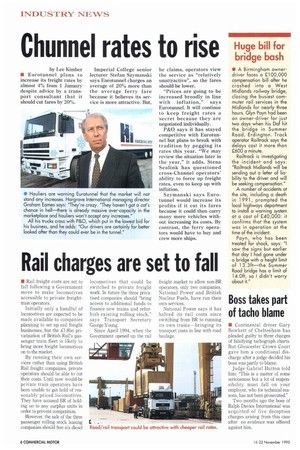Rail charges are set to fall
Page 8

If you've noticed an error in this article please click here to report it so we can fix it.
• Rail freight costs are set to fall following a Government move to make locomotives accessible to private freighttrain operators.
Initially only a handful of locomotives are expected to be made available to companies planning to set up rail freight businesses, but the £1.8bn privatisation of British Rail's passenger train fleet is likely to bring more freight locomotives on to the market.
By running their own services rather than using British Rail freight companies, private operators should be able to cut their costs. Until now would-be private train operators have been unable to get hold of reasonably priced locomotives. They have accused BR of holding on to any surplus units in order to prevent competition.
However, the sale of the three passenger rolling stock leasing companies should free six diesel locomotives that could be switched to private freight work. In future the three privatised companies should "bring access to additional funds to finance new trains and refurbish existing rolling stock," says Transport Secretary George Young.
Since April 1994, when the Government opened up the rail freight market to allow non-BR operators, only two companies, National Power and British Nuclear Fuels, have run their own services, National Power says it has halved its rail costs since switching from BR to running its own trains—bringing its transport costs in line with road haulage.




























































































































